Aug 30, 2016 | Focolare Worldwide
- From 7- 17 September for Latin America, North America and Oceania
- From 28 September – 8 October for Africa, Asia and the Middle East
- From 15 – 23 October for Europe
Around a hundred participants will attend every session (Castel Gandolfo Mariapolis Centre, Rome), with a program partly in common and another part with various themes based on the demands and needs of each geographic area. The themes to be discussed will range from enculturation in Africa to the emergency of refugees and dialogue with Islam in Europe; other topics will focus on the challenges in Latin America, Asia, the Middle East, North America and Oceania in the social and ecclesiastic fields, from the perspectives of the family, the new generations, ecumenical and interreligious dialogue, and many other themes.
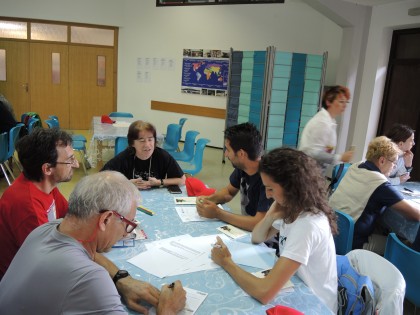
Aug 30, 2016 | Focolare Worldwide
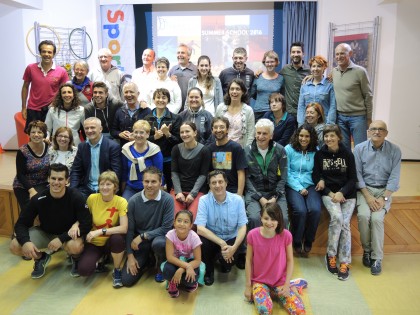 “Sport and Nature” was the title chosen for the 2016 Summer School organized by Sportmeet which gathered sport players from around the world to reflect on the environmental crisis and the specific contribution that sport could make to developing an authentic ecological conscience. Sport holds a great potential for creating friendship among peoples and with the Creation. It also has important educational value when practiced in the name of altruism and reciprocity. Eighty-three people attended the summer school: players at a variety of levels, ages and disciplines, leaders, physical education teachers and professional trainers, as well as others involved in sport as recreation. Paolo Cipolli, international coordinator of Sportmeet, presented the past and present history of the project. His presented had been preceded by numerous greetings from the public authorities who were present including Vice-Mayor Križevci Tomislav Katanović, Vice-President of the City Councill and ex-federal handball instructor, Ivan Pal, Deputy Minister off Science, Training and Sport, Hrvoje Šlezak from the Swiss Embassy in Croatia, Stefan Estermann, Second Secretary to the Italian Ambassador in Croatia whose greetings were given by Anna Lisa Gasparini and Zdenko Horvat.
“Sport and Nature” was the title chosen for the 2016 Summer School organized by Sportmeet which gathered sport players from around the world to reflect on the environmental crisis and the specific contribution that sport could make to developing an authentic ecological conscience. Sport holds a great potential for creating friendship among peoples and with the Creation. It also has important educational value when practiced in the name of altruism and reciprocity. Eighty-three people attended the summer school: players at a variety of levels, ages and disciplines, leaders, physical education teachers and professional trainers, as well as others involved in sport as recreation. Paolo Cipolli, international coordinator of Sportmeet, presented the past and present history of the project. His presented had been preceded by numerous greetings from the public authorities who were present including Vice-Mayor Križevci Tomislav Katanović, Vice-President of the City Councill and ex-federal handball instructor, Ivan Pal, Deputy Minister off Science, Training and Sport, Hrvoje Šlezak from the Swiss Embassy in Croatia, Stefan Estermann, Second Secretary to the Italian Ambassador in Croatia whose greetings were given by Anna Lisa Gasparini and Zdenko Horvat.  During the three-day course experts and instructors offered their reflections on the theme: “Sport and Nature: A Discovery, Resource and Challenge”. Andrea Ceciliani from the University of Bologna offered an exciting hand-on workshop. Mirna Andrijasević from Zagabria University presented “Sport in Nature: A Lifestyle.” Ivan Prskalo from Zagabria University presented Ecology and Chinesiology in Križevci presented an entertaining hands-on workshop on traditional Croatian games. Andrea Ceciliani from University of Bologna presented “Outdoor Education” showing how to hold school in the open, which was accompanied by a lively hands-on workshop. There were also school trips to Mount Kalnik and to Lake Čabraj along with an evening for sharing best practices with the Sportmeet Network, which included a telephone link-up with Rio de Janeiro and Belgrade. The last day began with a video conference that had been held by Focolare foundress Chiara Lubich at the United Nations in 1986 on the theme of Fraternity Among People and Nations. This was followed by a long and lively discussion with all the participants, and it helped design the plans for the upcoming Summer School in Barcelona, Spain, June 2017. Source: Sportmeet online
During the three-day course experts and instructors offered their reflections on the theme: “Sport and Nature: A Discovery, Resource and Challenge”. Andrea Ceciliani from the University of Bologna offered an exciting hand-on workshop. Mirna Andrijasević from Zagabria University presented “Sport in Nature: A Lifestyle.” Ivan Prskalo from Zagabria University presented Ecology and Chinesiology in Križevci presented an entertaining hands-on workshop on traditional Croatian games. Andrea Ceciliani from University of Bologna presented “Outdoor Education” showing how to hold school in the open, which was accompanied by a lively hands-on workshop. There were also school trips to Mount Kalnik and to Lake Čabraj along with an evening for sharing best practices with the Sportmeet Network, which included a telephone link-up with Rio de Janeiro and Belgrade. The last day began with a video conference that had been held by Focolare foundress Chiara Lubich at the United Nations in 1986 on the theme of Fraternity Among People and Nations. This was followed by a long and lively discussion with all the participants, and it helped design the plans for the upcoming Summer School in Barcelona, Spain, June 2017. Source: Sportmeet online
See also: Sportmeet in the Balkans: When Sports Unites
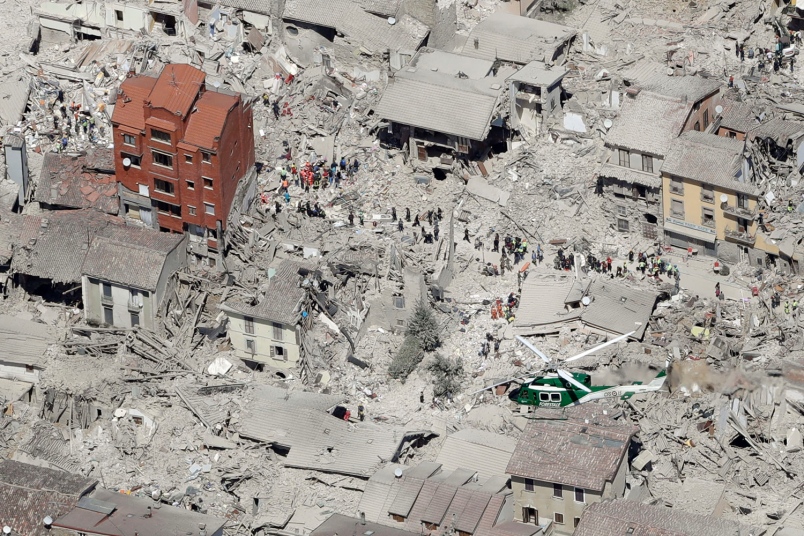
Aug 29, 2016 | Non categorizzato
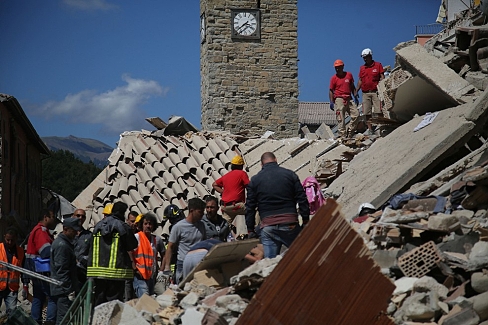 That clock tower on Amatrice church indicating 3:36 am is a powerful image for what happened this night. That minute was the last minute for many victims, it will be a minute forever remembered because it is written in the flesh and hearts of their families. And it will be remembered by our country, whose recent history is also a series of clocks stopped forever by the violence of men and of the earth. I will also remember it forever, because this cry of the earth also reached the house of my parents in Roccafluvione, around twenty kilometres from Arquata del Tronto, where I am visiting them. It was a long night of fear, suffering and thoughts for Amatrice, Arquata, Accumuli, towns of my childhood, close to where my grandparents come from, villages where I would accompany my father as he went about his business selling chickens. And then there were thoughts, thoughts we never have, because you can only have them on these terrible nights. I thought about all the time that clock had measured right up until 3.36. It stopped there, dead, but it was only one dimension of time which the Greeks called ‘kronos’: the surface, the soil of time. In the world there is our managed time, domesticated, constructed, which live by. But beneath it there is a another time: the time of the earth. This non-human time, and at times inhuman, and commands the time of men, mothers and children. And I thought that we are not the masters of this other time, which is deeper, abysmal, primitive, which doesn’t follow our path, and at times is against the paths of those who walk above. On such momentous nights we become aware of this different time, on which we walk and build our homes, and that we are ‘grass of the field’, watered and nourished by the sky, but also swallowed up by the earth.
That clock tower on Amatrice church indicating 3:36 am is a powerful image for what happened this night. That minute was the last minute for many victims, it will be a minute forever remembered because it is written in the flesh and hearts of their families. And it will be remembered by our country, whose recent history is also a series of clocks stopped forever by the violence of men and of the earth. I will also remember it forever, because this cry of the earth also reached the house of my parents in Roccafluvione, around twenty kilometres from Arquata del Tronto, where I am visiting them. It was a long night of fear, suffering and thoughts for Amatrice, Arquata, Accumuli, towns of my childhood, close to where my grandparents come from, villages where I would accompany my father as he went about his business selling chickens. And then there were thoughts, thoughts we never have, because you can only have them on these terrible nights. I thought about all the time that clock had measured right up until 3.36. It stopped there, dead, but it was only one dimension of time which the Greeks called ‘kronos’: the surface, the soil of time. In the world there is our managed time, domesticated, constructed, which live by. But beneath it there is a another time: the time of the earth. This non-human time, and at times inhuman, and commands the time of men, mothers and children. And I thought that we are not the masters of this other time, which is deeper, abysmal, primitive, which doesn’t follow our path, and at times is against the paths of those who walk above. On such momentous nights we become aware of this different time, on which we walk and build our homes, and that we are ‘grass of the field’, watered and nourished by the sky, but also swallowed up by the earth.  The earth, the real one and not the romantic and naive one of ideologies, is both mother and stepmother. The hummus generates man but also turns him back into dust, sometimes in a good way at the right time, but other times it is bad, and too soon, with a so much suffering. Biblical humanism knows this very well, but for this has fought a lot with the pagan cults of local peoples who wanted to make a divinity of the earth and its nature: the power of the earth has always fascinated men who have tried to ‘buy’ it with magic and sacrifices. Whilst I tried in vain to go back to sleep, I thought about the tremendous books of Job and Qohelet, which you can understand on such nights. Those books tell us that no God, not even the real one, can control the earth, because He too, once he entered into human history, became a victim of the mysterious freedom of his creation. God cannot even explain to us why children die squashed beneath the ancient pillars of our towns. He can’t explain it to us because if he knew why he would be a monstrous idol. God, who today looks on the land of the three As – Arquata, Accumuli and Amatrice – can only ask himself the same questions as us: he can cry out, remain silent, cry together with us. He can perhaps remind us with the words of the Bible that all is vanity of vanities: everything is breath, wind, mist, waste, nothing, ephemeral. Vanity in Hebrew is written Habel, the same word as Abel, the brother killed by Kane. Everything is vanity, everything is an infinite Abel: the world is full of victims. This we know. We know it, we forget it too often. These terrible nights and days make us remember. * 1 Kings 19:11
The earth, the real one and not the romantic and naive one of ideologies, is both mother and stepmother. The hummus generates man but also turns him back into dust, sometimes in a good way at the right time, but other times it is bad, and too soon, with a so much suffering. Biblical humanism knows this very well, but for this has fought a lot with the pagan cults of local peoples who wanted to make a divinity of the earth and its nature: the power of the earth has always fascinated men who have tried to ‘buy’ it with magic and sacrifices. Whilst I tried in vain to go back to sleep, I thought about the tremendous books of Job and Qohelet, which you can understand on such nights. Those books tell us that no God, not even the real one, can control the earth, because He too, once he entered into human history, became a victim of the mysterious freedom of his creation. God cannot even explain to us why children die squashed beneath the ancient pillars of our towns. He can’t explain it to us because if he knew why he would be a monstrous idol. God, who today looks on the land of the three As – Arquata, Accumuli and Amatrice – can only ask himself the same questions as us: he can cry out, remain silent, cry together with us. He can perhaps remind us with the words of the Bible that all is vanity of vanities: everything is breath, wind, mist, waste, nothing, ephemeral. Vanity in Hebrew is written Habel, the same word as Abel, the brother killed by Kane. Everything is vanity, everything is an infinite Abel: the world is full of victims. This we know. We know it, we forget it too often. These terrible nights and days make us remember. * 1 Kings 19:11
Aug 28, 2016 | Non categorizzato, Word of
We can bring all things as a gift to God, if we learn how to rejoice with those who rejoice and to weep with those who weep, transforming each pain into love. The setting of these words is the Christian community in Corinth. It was extremely lively, full of initiative, animated by groups linked to different charismatic leaders. This also gave rise to tensions among individuals and groups, to divisions, personality cults, the desire to dominate. Paul intervened decisively and reminded everyone that, in the richness and variety of gifts and leaders belonging to the community, something much deeper bound them in unity: belonging to God. Once more the great Christian proclamation rings out: God is with us, and we are not lost, orphaned, abandoned to ourselves, but, as God’s children, we are God’s. As a true Father God cares for each one, without letting us lack anything we need for our good. Indeed, God is superabundant in love and in giving, as Paul affirms: ‘The world, life, death, the present, the future—all belong to you!’ God has even given us his Son, Jesus. What huge trust on God’s part in giving each thing into our hands! How often instead have we abused his gifts! We have believed ourselves to be the lords of creation to the point of plundering and despoiling it, lords of our brothers and sisters to the point of enslaving and slaughtering them, lords of our own lives to the point of wasting them in narcissism and self- destruction. God’s huge gift – ‘All belong to you’ – asks for gratitude. Often we complain about what we don’t have and we only turn to God to ask. Why don’t we look around and discover the beauty and the goodness surrounding us? Why don’t we say thank you to God for what he gives us each day? This ‘All belong to you’ is also a responsibility. It demands our attention, our tenderness, our care for all that has been entrusted to us: the whole world and every human being, the same care that Jesus has for us (‘you belong to Christ’), the same care that the Father has for Jesus (‘Christ belongs to God’). We ought to know how to rejoice with those who rejoice and to weep with those who weep, ready to gather up every groan, division, pain, violence, as something that belongs to us, so as to share it, to the point of transforming it into love. Everything has been given to us so that we bring it to Christ, that is, to the fullness of life, and to God, that is, to its final goal, giving back the dignity and the deepest meaning that belong to each thing and to each person. One day in the summer of 1949, Chiara Lubich sensed such a unity with Christ that she felt bound to him as a bride to her Spouse. This led her to think of the dowry she would bring, and she understood that it should be the whole of creation! On his side, he would bring her as his inheritance the whole of Paradise. She remembered then the words of the psalm: ‘Ask of me, and I will make the nations your heritage, and the ends of the earth your possession.’ (Ps 2:8) And she commented: ‘And we believed and we asked and He gave us all things that we may bring them to Him and He will give us Heaven: we the created, He the Uncreated.’ Towards the end of her life, speaking of the Movement to which she had given life and in which she saw herself reflected, Chiara Lubich wrote: ‘What, just now, would be my last wish? I wish that the Work of Mary [that is, the Focolare Movement], at the end of the ages, when it will be waiting, united, to appear before Jesus forsaken and risen, may be able to repeat to him, making its own the words of the Belgian theologian Jacques Leclercq, words I always find moving: “On your day, my God, I shall come to you…. I shall come to you, my God … with my wildest dream: to bring you the world in my arms.” ’1 Fabio Ciardi 1 Essential Writings, (London and New York: New City and New City Press, 2007), p. 369.
American English version of the Word of Life
Subscribe to the monthly Word of Life in English

Aug 28, 2016 | Non categorizzato
 “While taking a short break, contemplating the immensity of the universe, the extraordinary beauty and power of nature, my mind rose spontaneously to the Creator of it all, to a new sort of understanding of God’s immensity. (…) I saw that he is so great, so great, so great that it seemed impossible he should think of us. This impression of God’s immensity stayed with me for several days. To pray, ‘Hallowed be thy name’, or ‘Glory be to the Father and to the Son and to the Holy Spirit’, is different for me now: it has become a need of the heart. … We are on a journey. When people travel, they are already thinking about the surroundings they will be in on their arrival, the landscape, the city; they are getting ready. We should do the same. Will we praise God up there? Then let’s start praising him right now, letting our hearts cry out to him with all our love… Let’s praise him with words and in our hearts. We can take this opportunity to enliven some of the prayers we say daily which have this purpose. Let’s glorify him also with our whole being. As we know, the more we become nothing (modelling ourselves on Jesus Forsaken, who reduced himself to nothing) the more we cry out with our lives that God is everything, and so we praise him, we glorify him and adore him. During the day let’s find many opportunities to adore God and praise him. Let’s do so during our meditation, or when visiting a church, or at Mass. Let’s praise him beyond nature or in the depths of our hearts. Above all, let’s live dead to ourselves and alive to the will of God, to love for our brothers and sisters. May we too be, as Elizabeth of the Trinity used to say, a living praise of his Glory. In this way we shall experience a bit of paradise, and make up for the indifference to God in many hearts living in the world today.”
“While taking a short break, contemplating the immensity of the universe, the extraordinary beauty and power of nature, my mind rose spontaneously to the Creator of it all, to a new sort of understanding of God’s immensity. (…) I saw that he is so great, so great, so great that it seemed impossible he should think of us. This impression of God’s immensity stayed with me for several days. To pray, ‘Hallowed be thy name’, or ‘Glory be to the Father and to the Son and to the Holy Spirit’, is different for me now: it has become a need of the heart. … We are on a journey. When people travel, they are already thinking about the surroundings they will be in on their arrival, the landscape, the city; they are getting ready. We should do the same. Will we praise God up there? Then let’s start praising him right now, letting our hearts cry out to him with all our love… Let’s praise him with words and in our hearts. We can take this opportunity to enliven some of the prayers we say daily which have this purpose. Let’s glorify him also with our whole being. As we know, the more we become nothing (modelling ourselves on Jesus Forsaken, who reduced himself to nothing) the more we cry out with our lives that God is everything, and so we praise him, we glorify him and adore him. During the day let’s find many opportunities to adore God and praise him. Let’s do so during our meditation, or when visiting a church, or at Mass. Let’s praise him beyond nature or in the depths of our hearts. Above all, let’s live dead to ourselves and alive to the will of God, to love for our brothers and sisters. May we too be, as Elizabeth of the Trinity used to say, a living praise of his Glory. In this way we shall experience a bit of paradise, and make up for the indifference to God in many hearts living in the world today.”
Chiara Lubich
(Chiara Lubich, Cercando le cose di lassù, Roma 1992, p. 15-17)
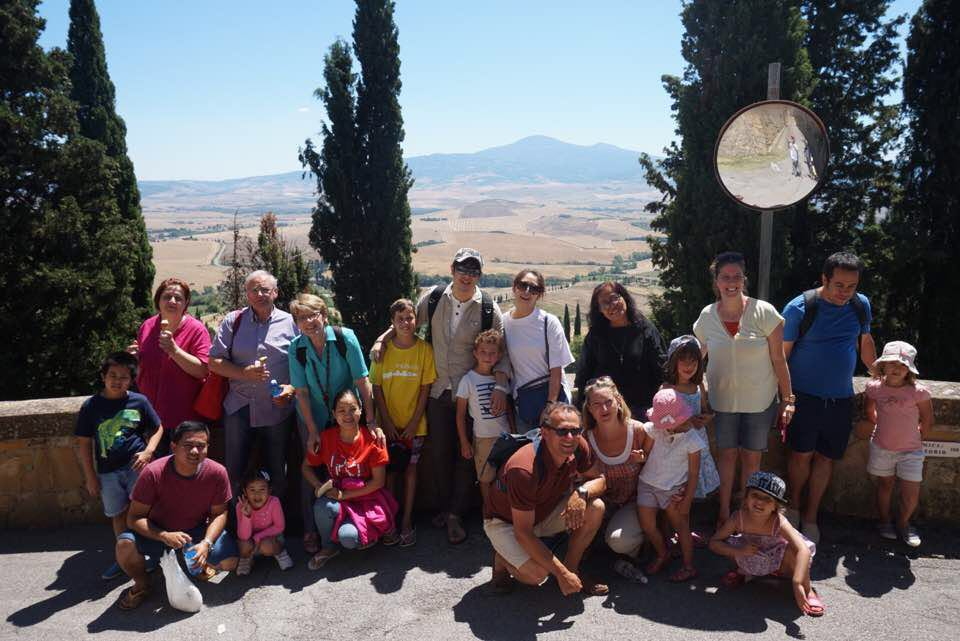
Aug 27, 2016 | Focolare Worldwide
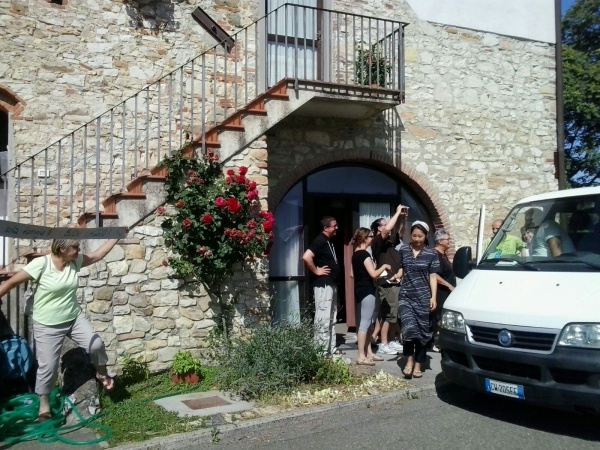 Another year at Loreto School has come to an end and the families have returned to their homes in Brazil, Cameroon and the Czech Republic enriched by a gift that will never be wiped away but shared with the world around them. That doesn’t mean that Loreto School is now on vacation: it continues through the summer months. In the month of July there was series of families that showed up from several regions of Italy, Europe and other countries like Korea, Vietnam and Philippines for a period of vacation in the spirit of the Focolare. They lived and experienced the communion of goods. One donated a new lawn mower, which was useful in trimming the green areas around the lodgings. Another donated an electric sander that was used to brighten up the framing, doors and benches. . .
Another year at Loreto School has come to an end and the families have returned to their homes in Brazil, Cameroon and the Czech Republic enriched by a gift that will never be wiped away but shared with the world around them. That doesn’t mean that Loreto School is now on vacation: it continues through the summer months. In the month of July there was series of families that showed up from several regions of Italy, Europe and other countries like Korea, Vietnam and Philippines for a period of vacation in the spirit of the Focolare. They lived and experienced the communion of goods. One donated a new lawn mower, which was useful in trimming the green areas around the lodgings. Another donated an electric sander that was used to brighten up the framing, doors and benches. . .  Working together to fix up the flats, welcome the families, cut the grass and prune the trees, created an atmosphere of communion, lightened the work and created a sense of joy. People passing through Loppiano also got to shared in that family atmosphere and wanted to learn more about Loreto School and the New Families Movement. There were also opportunities for couples to discuss family issues in a relaxed setting with the help of experts, and the opportunity to take part in events at the permanent Mariapolis. There were many meals in the open air, field trips, moments for relaxation together – all in an atmosphere of evangelical brotherhood which is the law of Loppiano where Loreto School is located. One family from France was there on July 14th in Nice, the day of the terrible massacre along the sea, but they had fortunately decided to watch the fireworks on a hill overlooking the city. This experience taught them that life is a gift, and they felt called to spend the rest of their lives together spreading love to others. When it came time to leave Loppiano, the families, one by one, expressed their wish to return for the same experience next year, saying that despite the hard work they felt completely restored!
Working together to fix up the flats, welcome the families, cut the grass and prune the trees, created an atmosphere of communion, lightened the work and created a sense of joy. People passing through Loppiano also got to shared in that family atmosphere and wanted to learn more about Loreto School and the New Families Movement. There were also opportunities for couples to discuss family issues in a relaxed setting with the help of experts, and the opportunity to take part in events at the permanent Mariapolis. There were many meals in the open air, field trips, moments for relaxation together – all in an atmosphere of evangelical brotherhood which is the law of Loppiano where Loreto School is located. One family from France was there on July 14th in Nice, the day of the terrible massacre along the sea, but they had fortunately decided to watch the fireworks on a hill overlooking the city. This experience taught them that life is a gift, and they felt called to spend the rest of their lives together spreading love to others. When it came time to leave Loppiano, the families, one by one, expressed their wish to return for the same experience next year, saying that despite the hard work they felt completely restored!

Aug 26, 2016 | Non categorizzato
 Student accommodation “I live with six other students in a rented flat. We divided the chores and cleaning shifts,but Franz was not helping out and thus created tension in the group. I tried in vain to remind him. One day, precisely his family was coming to visit, and as an act of love for them, I started cleaning the bathrooms and also Franz’s room. His parents and sister were so pleased with the order they found that before leaving, they went to shop for loads of food that filled the fridge. Since then Franz has become very thoughtful and caring towards others. (F.F. – Austria) The poor helping the poor “That couple was extremely poor and ashamed of it, and their worries reached a peak with the arrival of their first son. The love of other friends warmed their hearts. Struck by the story of an equally poor family, but that believed that God who is a Father never abandons his children, they thought of sharing some of their food with another poor family. And the next day to their surprise, they saw all sorts of foodstuff arriving at their doorstep. In addition, there were also the things their son needed, a cradle, baby clothes, bathtub….…” (J.E. – Brazil)
Student accommodation “I live with six other students in a rented flat. We divided the chores and cleaning shifts,but Franz was not helping out and thus created tension in the group. I tried in vain to remind him. One day, precisely his family was coming to visit, and as an act of love for them, I started cleaning the bathrooms and also Franz’s room. His parents and sister were so pleased with the order they found that before leaving, they went to shop for loads of food that filled the fridge. Since then Franz has become very thoughtful and caring towards others. (F.F. – Austria) The poor helping the poor “That couple was extremely poor and ashamed of it, and their worries reached a peak with the arrival of their first son. The love of other friends warmed their hearts. Struck by the story of an equally poor family, but that believed that God who is a Father never abandons his children, they thought of sharing some of their food with another poor family. And the next day to their surprise, they saw all sorts of foodstuff arriving at their doorstep. In addition, there were also the things their son needed, a cradle, baby clothes, bathtub….…” (J.E. – Brazil)  Praying for rain “That evening I felt very tired and wanted to tell the kids to say their night prayers by themselves in the room so I could immediately go to bed. But John, our eldest, asked if we could say the rosary to pray for rain: in fact, it hadn’t rained for a long time and the corn and sweet potatoes we had planted really needed it. To our surprise, that same night it started to rain and continued up to the afternoon of the next day.” (B. M. – Uganda) The armchairs “In our place, most parents incur so many debts for the weddings of their daughters and consequently have to work all their lives to paythem. For my wedding I made my parents spend as little as possible, confiding in Divine Providence. One day I went with my mom to the furniture shop. At the end he said,«Usually the other girls are never satisfied with what they find… but you are different. I would like to ask you to pray for my son who is very sick.». I assured him that I would do so, and he gave me two armchairs as a wedding gift: it was exactly what I needed.” (C. J. – Pakistan).
Praying for rain “That evening I felt very tired and wanted to tell the kids to say their night prayers by themselves in the room so I could immediately go to bed. But John, our eldest, asked if we could say the rosary to pray for rain: in fact, it hadn’t rained for a long time and the corn and sweet potatoes we had planted really needed it. To our surprise, that same night it started to rain and continued up to the afternoon of the next day.” (B. M. – Uganda) The armchairs “In our place, most parents incur so many debts for the weddings of their daughters and consequently have to work all their lives to paythem. For my wedding I made my parents spend as little as possible, confiding in Divine Providence. One day I went with my mom to the furniture shop. At the end he said,«Usually the other girls are never satisfied with what they find… but you are different. I would like to ask you to pray for my son who is very sick.». I assured him that I would do so, and he gave me two armchairs as a wedding gift: it was exactly what I needed.” (C. J. – Pakistan).
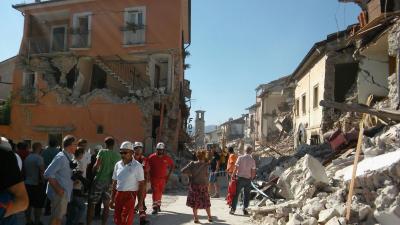
Aug 25, 2016 | Focolare Worldwide, Senza categoria
 “It’s the day after the earthquake that shook central Italy. As we write, the number of victims has reached 247 people and is rising. Many were children because they are often left with their grandparents during the summer months in Amatrice, Accumoli, Arquata and Pescara Tonto. More than 4,000 people have had to leave their homes in the two regions most damaged by the quake: Lazio and Marche. The aftershocks never end.” “The real face of this growing tragedy is the generosity of the many volunteers that arrived on the scene immediately and in great numbers, working non-stop at digging, first with their bare hands, then with buckets and finally with more sophisticated equipment. The willingness of the local people was also immediate providing basic needs, standing in lines for hours at the hospital to donate blood and to sleeping in tents in order to continue offering help and comfort.” “Ever since yesterday at 3:30 when we were awakened by the first shock, we have been directly following events in constant contact with the many people of the Movement that live in these regions. We were glad to hear about the Gen and his grandfather who were removed alive from the rubble; also the father-in-law and sister-in-law of a married focolarina. We were holding our breath all day long wondering about Rita, her niece and nephew – fourteen year old Elisa, twelve year old Gabriele and their grandmother who were still buried in the rubble. In the evening we received a message from their mother: “They all went to Jesus.” Other members of the Movement who were vacationing in Amatrice managed to reach safety.” “For all of us it was an opportunity to pull together in unity and live for others. From Umbria they write: “Thank you for your prayers and unity that have spread like a chain through the whole Movement in Umbria and supported us during this night of fear and trembling. Hearing that we were all alive made us thank God, and then our thoughts went to the ones who were still trapped beneath the rubble and to those who had lost everything. The fact of going online supported us and allowed us to follow events in the worst areas in real time. Elisabetta from Assisi told us that our message arrived at precisely the worst moment and brought her peace. We feel like a family more than ever. The Gen are online ready to offer support and are in the process of going into the worst hit cities to offer help. The adults are also willing to get involved concretely. Meanwhile, we promise to pray for those families that have suffered great loss.” “Right away messages were being sent out that told of the needs and the possibilities of assistance, primarily with the help of the Civil Protection and others. In Ascoli where we work alongside other associations, we began a clothing drive. The same was true in Lazio where the people from Abruzzese who are experts after the earthquake of Aquila (2009), mapped out lodging sites for the evacuees. Other regions have also offered lodging.” “We continue to stay connected with everyone and gradually understand how we can concretely respond to all this suffering in which we see the “face” of Jesus Forsaken.”
“It’s the day after the earthquake that shook central Italy. As we write, the number of victims has reached 247 people and is rising. Many were children because they are often left with their grandparents during the summer months in Amatrice, Accumoli, Arquata and Pescara Tonto. More than 4,000 people have had to leave their homes in the two regions most damaged by the quake: Lazio and Marche. The aftershocks never end.” “The real face of this growing tragedy is the generosity of the many volunteers that arrived on the scene immediately and in great numbers, working non-stop at digging, first with their bare hands, then with buckets and finally with more sophisticated equipment. The willingness of the local people was also immediate providing basic needs, standing in lines for hours at the hospital to donate blood and to sleeping in tents in order to continue offering help and comfort.” “Ever since yesterday at 3:30 when we were awakened by the first shock, we have been directly following events in constant contact with the many people of the Movement that live in these regions. We were glad to hear about the Gen and his grandfather who were removed alive from the rubble; also the father-in-law and sister-in-law of a married focolarina. We were holding our breath all day long wondering about Rita, her niece and nephew – fourteen year old Elisa, twelve year old Gabriele and their grandmother who were still buried in the rubble. In the evening we received a message from their mother: “They all went to Jesus.” Other members of the Movement who were vacationing in Amatrice managed to reach safety.” “For all of us it was an opportunity to pull together in unity and live for others. From Umbria they write: “Thank you for your prayers and unity that have spread like a chain through the whole Movement in Umbria and supported us during this night of fear and trembling. Hearing that we were all alive made us thank God, and then our thoughts went to the ones who were still trapped beneath the rubble and to those who had lost everything. The fact of going online supported us and allowed us to follow events in the worst areas in real time. Elisabetta from Assisi told us that our message arrived at precisely the worst moment and brought her peace. We feel like a family more than ever. The Gen are online ready to offer support and are in the process of going into the worst hit cities to offer help. The adults are also willing to get involved concretely. Meanwhile, we promise to pray for those families that have suffered great loss.” “Right away messages were being sent out that told of the needs and the possibilities of assistance, primarily with the help of the Civil Protection and others. In Ascoli where we work alongside other associations, we began a clothing drive. The same was true in Lazio where the people from Abruzzese who are experts after the earthquake of Aquila (2009), mapped out lodging sites for the evacuees. Other regions have also offered lodging.” “We continue to stay connected with everyone and gradually understand how we can concretely respond to all this suffering in which we see the “face” of Jesus Forsaken.”
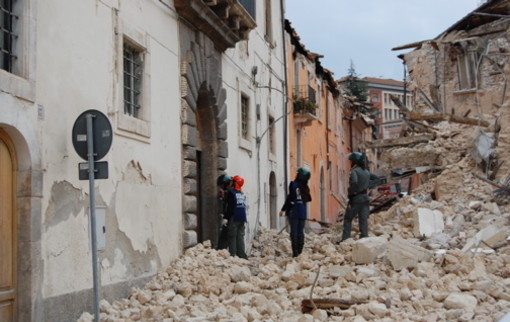
Aug 24, 2016 | Focolare Worldwide
 Messages have been pouring in at the website following the earthquake near Amatrice and Norcia, between the provinces of Rieti and Ascoli Piceno in central Italy. Some tell about extracting a grandfather from the rubble safe and sound; others about rushing a cousin to hospital where they are still waiting. Some express their deep distress over what has happened, while others are trying to help or at least be close to friends and acquaintances who have suffered damage and casualties.” So writes the editor of Città Nuova, the Focolare’s press office in Italy, about the strong 6.0 magnitude earthquake that occurred between the villages of Norcia and Amatrice. The Focolare Movement worldwide expresses its closeness to the populations that were hit by the earthquake in central Italy and offers prayers for the victims, their families and everyone who has suffered material or moral harm. Some Focolare members are all ready at the scene working together with many other volunteers in the arduous task of rescuing people from the ruins and trying to comfort those who have lost loved ones. Coordinated assistance has begun and contributions can be made to the following accounts: CAUSE: Emergenza Terremoto Italia
Messages have been pouring in at the website following the earthquake near Amatrice and Norcia, between the provinces of Rieti and Ascoli Piceno in central Italy. Some tell about extracting a grandfather from the rubble safe and sound; others about rushing a cousin to hospital where they are still waiting. Some express their deep distress over what has happened, while others are trying to help or at least be close to friends and acquaintances who have suffered damage and casualties.” So writes the editor of Città Nuova, the Focolare’s press office in Italy, about the strong 6.0 magnitude earthquake that occurred between the villages of Norcia and Amatrice. The Focolare Movement worldwide expresses its closeness to the populations that were hit by the earthquake in central Italy and offers prayers for the victims, their families and everyone who has suffered material or moral harm. Some Focolare members are all ready at the scene working together with many other volunteers in the arduous task of rescuing people from the ruins and trying to comfort those who have lost loved ones. Coordinated assistance has begun and contributions can be made to the following accounts: CAUSE: Emergenza Terremoto Italia
| Azione per un Mondo Unito ONLUS (AMU) |
Azione per Famiglie Nuove ONLUS (AFN) |
| IBAN: IT16 G050 1803 2000 0000 0120 434 at Banca Popolare Etica |
IBAN: IT55 K033 5901 6001 0000 0001 060 at Banca Prossima |
| Code SWIFT/BIC: CCRTIT2184D |
Code SWIFT/BIC: BCITITMX |
Contributions made to either of these accounts for the earthquake emergency cause will be jointly administrated by the Focolare’s Action for a United World (AMU) and New Families Association (AFN). There are tax benefits attached to such contributions in many countries of the European Union and in other countries.
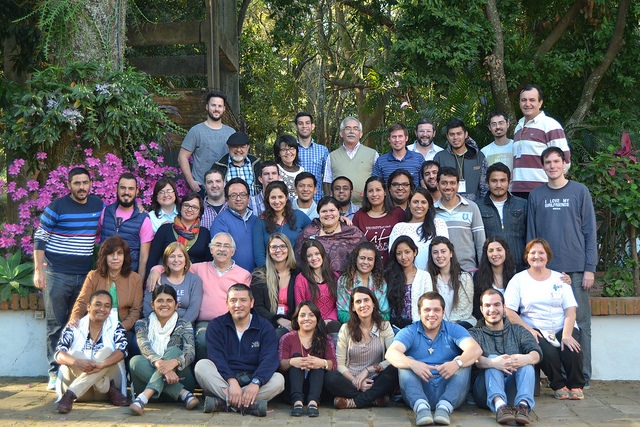
Aug 24, 2016 | Focolare Worldwide
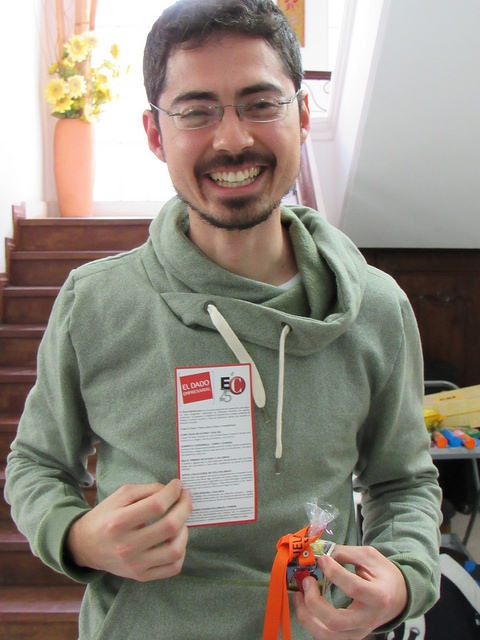 To hear them talk they sound like small heroes, but they don’t feel that they are. They simply believe they are doing the right thing. We not only refer to the established business people from the Economy of Communion (EoC), but also the 30 young aspirants who jumped body and soul into a 5-day adventure of sharing. Thanks to the EoC, Xandra managed to overcome the difficult period her family was going through when she was a teenager, and now she is the one hiring a pair of teenagers in her own beauty salon where she tries to build relationships of reciprocity with customers, suppliers and the society around her. Dalila had to close her business but then was able to get back on her feet and start over again. She swears that despite the crisis in Brazil she isn’t experiencing any of its effects. She says that this is because of the “secret partner” which is how the EoC refers to God’s providential intervention.
To hear them talk they sound like small heroes, but they don’t feel that they are. They simply believe they are doing the right thing. We not only refer to the established business people from the Economy of Communion (EoC), but also the 30 young aspirants who jumped body and soul into a 5-day adventure of sharing. Thanks to the EoC, Xandra managed to overcome the difficult period her family was going through when she was a teenager, and now she is the one hiring a pair of teenagers in her own beauty salon where she tries to build relationships of reciprocity with customers, suppliers and the society around her. Dalila had to close her business but then was able to get back on her feet and start over again. She swears that despite the crisis in Brazil she isn’t experiencing any of its effects. She says that this is because of the “secret partner” which is how the EoC refers to God’s providential intervention. 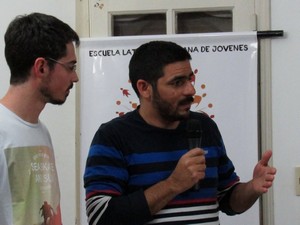 It is a requirement in a summer school for business owners to talk about their failures and learn from each other, especially since the values of the EoC are not often understood by people outside that world. This was the case with Germán e Matías whose projects were ruined and earnings lost because of dishonest partners. The programme that was largely comprised of question-and-answer sessions offered a presentation of the EoC that highlighted the cultural novelty of the project, given by philosopher Cecilia Blanco; the secret of how to overcome difficulties “without fleeing from problems” by building contractor Raúl Di Lascio; a proposal on how to distribute profits and have the foresight to avoid creating dependency in the people that receive assistance; knowing how to distinguish between healthy ambition and status and being well-off.
It is a requirement in a summer school for business owners to talk about their failures and learn from each other, especially since the values of the EoC are not often understood by people outside that world. This was the case with Germán e Matías whose projects were ruined and earnings lost because of dishonest partners. The programme that was largely comprised of question-and-answer sessions offered a presentation of the EoC that highlighted the cultural novelty of the project, given by philosopher Cecilia Blanco; the secret of how to overcome difficulties “without fleeing from problems” by building contractor Raúl Di Lascio; a proposal on how to distribute profits and have the foresight to avoid creating dependency in the people that receive assistance; knowing how to distinguish between healthy ambition and status and being well-off. 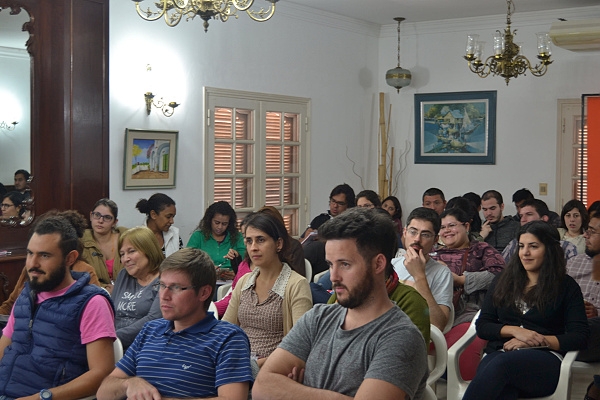 Yamil from Mexico explained the way he managed to involve thirty business owners, young like himself, in promoting interaction. The university noticed that their projects were serious and provided them with resources and know-how. Their “active networking” project that includes fortnightly meetings where personal knowledge can be shared that provide interesting topics for discussion is being welcomed with enthusiasm and results precisely because of the way it creates commercial and operative synergies. Luis Alonso from Mexico presented the new EoC-IIN Economy of Communion International Incubating Network.
Yamil from Mexico explained the way he managed to involve thirty business owners, young like himself, in promoting interaction. The university noticed that their projects were serious and provided them with resources and know-how. Their “active networking” project that includes fortnightly meetings where personal knowledge can be shared that provide interesting topics for discussion is being welcomed with enthusiasm and results precisely because of the way it creates commercial and operative synergies. Luis Alonso from Mexico presented the new EoC-IIN Economy of Communion International Incubating Network.  The “school trip” included a visit to the San Miguel di Capiatà quarter’s Focolare social project, the EoC’s Dispensa Santa Rita and Todo Brillo businesses. All were quite impressed by the children from the Unipar School of San Miguel who seemed to shine with the love they learn (and teach!) using the Dice of Love, and by the young and old people in that neighbourhood who have become masters of their own destiny thanks to the efficacious efforts at empowerment. Julio and Ninfa run the Dispensa Santa Rita in the popular quarter of Areguá. In order to avoid smuggling they never purchase basic need items in the city of Clorinda on the Argentinean border, but “give up time” arranging local goods in packages that are more appropriately priced for their customers. This made Matías from Paraguay remark: “I understood that the size of a business doesn’t lie in its revenue, but in the values that are lived inside that business.” Uruguayan professor Juan José Medeiros gave a presentation on Wealth and Poverty in the EoC” and Paraguayan historian Diana Durán brought an original touch with her presentation on the similarities between the EoC and the social and economic culture of the Guaraní indigenous people whose lineage can be traced back to the very roots of Paraguay. There was a long and stimulating Skype conversation with Luigi Bruni, Anouk Grevin and Luca Crivelli from the EoC’s Central Commission, and another discussion with Rebeca Gomez Tafalla and Florencia Locascio from EoC-inn which concluded the programme. Upcoming events: September conference in Salta, Argentina; EoC-INN, in Cuba. Source: EoC online
The “school trip” included a visit to the San Miguel di Capiatà quarter’s Focolare social project, the EoC’s Dispensa Santa Rita and Todo Brillo businesses. All were quite impressed by the children from the Unipar School of San Miguel who seemed to shine with the love they learn (and teach!) using the Dice of Love, and by the young and old people in that neighbourhood who have become masters of their own destiny thanks to the efficacious efforts at empowerment. Julio and Ninfa run the Dispensa Santa Rita in the popular quarter of Areguá. In order to avoid smuggling they never purchase basic need items in the city of Clorinda on the Argentinean border, but “give up time” arranging local goods in packages that are more appropriately priced for their customers. This made Matías from Paraguay remark: “I understood that the size of a business doesn’t lie in its revenue, but in the values that are lived inside that business.” Uruguayan professor Juan José Medeiros gave a presentation on Wealth and Poverty in the EoC” and Paraguayan historian Diana Durán brought an original touch with her presentation on the similarities between the EoC and the social and economic culture of the Guaraní indigenous people whose lineage can be traced back to the very roots of Paraguay. There was a long and stimulating Skype conversation with Luigi Bruni, Anouk Grevin and Luca Crivelli from the EoC’s Central Commission, and another discussion with Rebeca Gomez Tafalla and Florencia Locascio from EoC-inn which concluded the programme. Upcoming events: September conference in Salta, Argentina; EoC-INN, in Cuba. Source: EoC online
Photo album
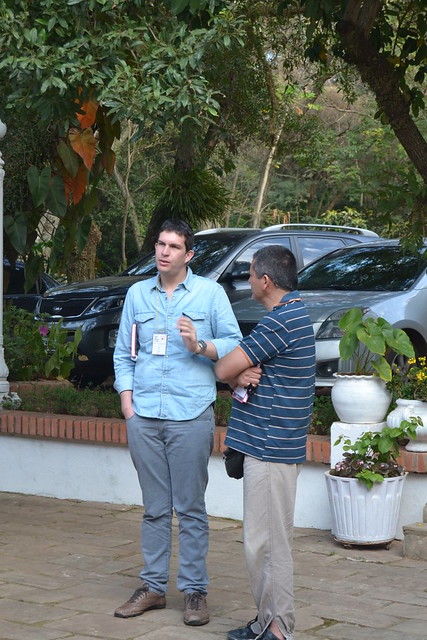
Photo on Flickr




 That clock tower on Amatrice church indicating 3:36 am is a powerful image for what happened this night. That minute was the last minute for many victims, it will be a minute forever remembered because it is written in the flesh and hearts of their families. And it will be remembered by our country, whose recent history is also a series of clocks stopped forever by the violence of men and of the earth. I will also remember it forever, because this cry of the earth also reached the house of my parents in Roccafluvione, around twenty kilometres from Arquata del Tronto, where I am visiting them. It was a long night of fear, suffering and thoughts for Amatrice, Arquata, Accumuli, towns of my childhood, close to where my grandparents come from, villages where I would accompany my father as he went about his business selling chickens. And then there were thoughts, thoughts we never have, because you can only have them on these terrible nights. I thought about all the time that clock had measured right up until 3.36. It stopped there, dead, but it was only one dimension of time which the Greeks called ‘kronos’: the surface, the soil of time. In the world there is our managed time, domesticated, constructed, which live by. But beneath it there is a another time: the time of the earth. This non-human time, and at times inhuman, and commands the time of men, mothers and children. And I thought that we are not the masters of this other time, which is deeper, abysmal, primitive, which doesn’t follow our path, and at times is against the paths of those who walk above. On such momentous nights we become aware of this different time, on which we walk and build our homes, and that we are ‘grass of the field’, watered and nourished by the sky, but also swallowed up by the earth.
That clock tower on Amatrice church indicating 3:36 am is a powerful image for what happened this night. That minute was the last minute for many victims, it will be a minute forever remembered because it is written in the flesh and hearts of their families. And it will be remembered by our country, whose recent history is also a series of clocks stopped forever by the violence of men and of the earth. I will also remember it forever, because this cry of the earth also reached the house of my parents in Roccafluvione, around twenty kilometres from Arquata del Tronto, where I am visiting them. It was a long night of fear, suffering and thoughts for Amatrice, Arquata, Accumuli, towns of my childhood, close to where my grandparents come from, villages where I would accompany my father as he went about his business selling chickens. And then there were thoughts, thoughts we never have, because you can only have them on these terrible nights. I thought about all the time that clock had measured right up until 3.36. It stopped there, dead, but it was only one dimension of time which the Greeks called ‘kronos’: the surface, the soil of time. In the world there is our managed time, domesticated, constructed, which live by. But beneath it there is a another time: the time of the earth. This non-human time, and at times inhuman, and commands the time of men, mothers and children. And I thought that we are not the masters of this other time, which is deeper, abysmal, primitive, which doesn’t follow our path, and at times is against the paths of those who walk above. On such momentous nights we become aware of this different time, on which we walk and build our homes, and that we are ‘grass of the field’, watered and nourished by the sky, but also swallowed up by the earth. 

 Another year at
Another year at 
 Student accommodation “I live with six other students in a rented flat. We divided the chores and cleaning shifts,but Franz was not helping out and thus created tension in the group. I tried in vain to remind him. One day, precisely his family was coming to visit, and as an act of love for them, I started cleaning the bathrooms and also Franz’s room. His parents and sister were so pleased with the order they found that before leaving, they went to shop for loads of food that filled the fridge. Since then Franz has become very thoughtful and caring towards others. (F.F. –
Student accommodation “I live with six other students in a rented flat. We divided the chores and cleaning shifts,but Franz was not helping out and thus created tension in the group. I tried in vain to remind him. One day, precisely his family was coming to visit, and as an act of love for them, I started cleaning the bathrooms and also Franz’s room. His parents and sister were so pleased with the order they found that before leaving, they went to shop for loads of food that filled the fridge. Since then Franz has become very thoughtful and caring towards others. (F.F. – 





